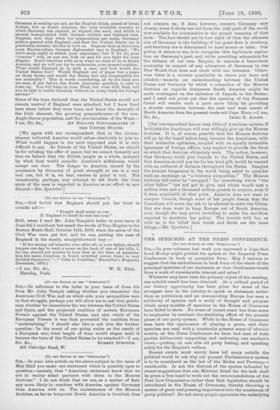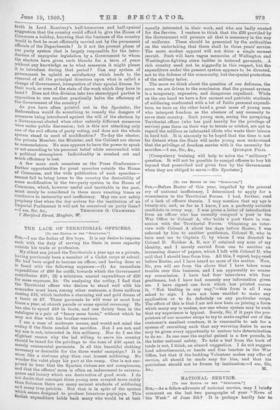THE SPEECHES AT THE PRESS CONFERENCE. [To TOR EDITOR OF
Taft "9tqcu1'1roit."1
Sin,—In your columns last week you expressed a hope that Lord Morley might publish his speech at the Imperial Press Conference in book or pamphlet form. May I venture to suggest that the embodiment in book form of the whole of the principal speeches of our statesmen at that Conference would form a work of considerable interest and value P
Whatever may have been the primary object of the meeting, one notable result has been obtained. At a critical period of our history opportunity has been given for some of the strongest men in the country to speak as statesmen rather than as politicians, and an unsuspecting Europe has seen a solidarity of opinion and a unity of thought and purpose which many months of speeches in the House of Commons have failed to show. No event of recent years has done more to emphasise by contrast the sterilising effect of the present phase of our party system. While in the House of Coin inane men have the appearance of playing a game, and their speeches are read with a constantly present sense of ulterior motive, at the Press Conference we have had men of both parties deliberately supporting and endorsing one another's views,—putting on one side all party feeling, and speaking solely for the Empire's welfare.
Recent events must surely have led many outside the political world to ask why our present Parliamentary system is to be considered as the law of the Medea and Persians,— unalterable. Is not the distrust of the system indicated by recent suggestions that one Minister fitted for the task shall be given a free hand to work out the recommendations of the Poor Law Commission rather than that legislation should be introduced in the House of Commons, thereby throwing .a matter of great and pressing importance into the maelstrom of party politics P Do not many people appreciate the underlying
truth in Lord Rosebery's half-humorous and half-cynical suggestion that the country could afford to give the House of Commons a holiday, knowing that the business of the country would in fact be most efficiently carried out by the permanent officials of the Departments ? Is it not the present phase of our party system that is largely responsible for the intro- duction of unpopular legislation by a Government to whom the electors have given carte blanche for a term of years Without any knowledge as to what measures it might please it to introduce during that period P Can any system of government be upheld as satisfactory which leads to the removal of all the principal directors upon what is called a change of Government, irrespective of their special fitness for their work, or even of the state of the work which they have in hand ? Does not this division into two stereotyped parties in opposition to one another practically halve the efficiency of the Government of the country ?
As you have often pointed out in the Spectator, the Referendum would do something to remedy the dangers of measures being introduced against the will of the electors by it Government elected when other entirely different measures were under public discussion ; but is this not attacking only one of the evil effects of party voting, and does not the whole system stand in need of modification? To-day the elector, the private Member, the Minister, and the Cabinet are slaves to nomenclature. No man appears to have the power to speak or act according to his personal belief while surrounded with a political atmosphere. Individuality is crushed out and much efficiency is lost.
A few more such occasions as the Press Conference— further opportunities for great speeches outside the House of Commons, and the wide publication of such speeches— cannot fail to bring home to the country the desirability of some modification in the two-party system in the House of Commons, which, however useful and inevitable in the past, must surely be considered in these more exacting times as conducive to insincerity and inefficiency. May one not safely prophesy that when the day arrives for the institution of an Imperial Parliament it will not he conceived on party lines P am, Sir, &a., THEODORE G. CHAMBERS. 7 Hertford Street, Mayfair, W.











































 Previous page
Previous page